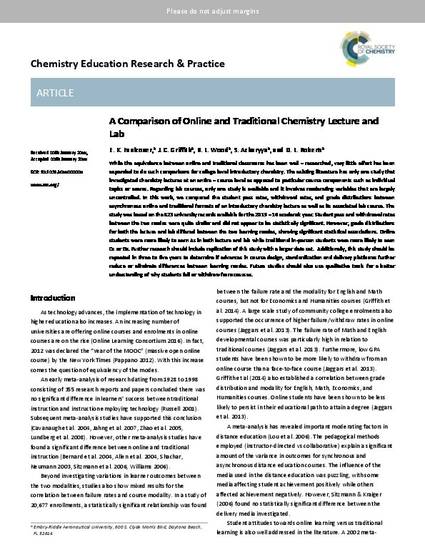
Article
A Comparison of Online and Traditional Chemistry Lecture and Lab
Chemistry Education Research and Practice
(2017)
Abstract
While the equivalence between online and traditional classrooms has been well – researched, very little effort has been expended to do such comparisons for college level introductory chemistry. The existing literature has only one study that investigated chemistry lectures at an entire – course level as opposed to particular course components such as individual topics or exams. Regarding lab courses, only one study is available and it involves moderating variables that are largely uncontrolled. In this work, we compared the student pass rates, withdrawal rates, and grade distributions between asynchronous online and traditional formats of an introductory chemistry lecture as well as its associated lab course. The study was based on the 823 university records available for the 2015 – 16 academic year. Student pass and withdrawal rates between the two modes were quite similar and did not appear to be statistically significant. However, grade distributions for both the lecture and lab differed between the two learning modes, showing significant statistical associations. Online students were more likely to earn As in both lecture and lab while traditional in-person students were more likely to earn Cs or Ds. Further research should include replication of this study with a larger data set. Additionally, this study should be repeated in three to five years to determine if advances in course design, standardization and delivery platforms further reduce or eliminate differences between learning modes. Future studies should also use qualitative tools for a better understanding of why students fail or withdraw from courses.
Keywords
- online,
- chemistry,
- comparison of online vs lecture outcomes,
- student performance in online vs lecture
Disciplines
Publication Date
December 18, 2017
DOI
https://doi.org/10.1039/C7RP00173H
Publisher Statement
As scientific research is becoming more open and discoverable, the Royal Society of Chemistry supports our community of chemical scientists in sharing new research findings before and after publication through a variety of methods.
Authors publishing in our journals may present their research ahead of publication in the following ways.
- Through the deposition of a preprint version of the article in non-commercial repositories (eg ArXiv, ChemRxiv), institutional repositories or authors’ individual websites - a preprint is defined here as an un-refereed author version of the article; a non-commercial repository is defined here as any platform or archiving service that makes digital content free to deposit and access
- At scientific conferences; this includes recorded presentations, poster presentations and abstracts that are made openly available online
- In commercial or non-commercial databases (data without interpretation, discussion, conclusions or context with a wider experimental project)
- In an open electronic lab notebook
- In blogs, wikis, tweets, and other informal communication channels
- As a thesis or dissertation published as part of an academic or professional qualification, in print and online
In any digital medium which is operated by the Royal Society of Chemistry, excluding journals, books and magazines
Citation Information
E. K. Faulconer, J. C. Griffith, B. L. Wood, S. Acharyya, et al.. "A Comparison of Online and Traditional Chemistry Lecture and Lab" Chemistry Education Research and Practice Vol. 19 Iss. 1 (2017) p. 392 - 397 ISSN: 1756-1108 Available at: http://works.bepress.com/emily-faulconer/3/
